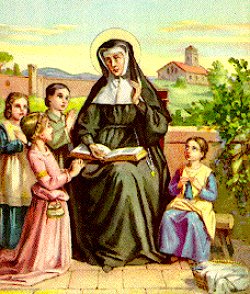HOMILY WEEK 03 04 – Year II
Gratefully Gifted – Graciously Giving Our Light Away:
Optional Memorial of St. Angela Merici
(2 Sam 7:18-19, 24-29; Ps 132; Mk 4:21-25))
************************************************
“Who am I, Lord God, that you have brought me to this point? (2 Samuel 7:18)
David was a man of many gifts. He loved God with all his heart. He was a talented musician. He had the courage to face and defeat Goliath. After becoming king, he captured Jerusalem and brought the ark of the covenant there. A wise ruler, he eventually united the tribes of Israel and reigned over them for nearly forty years.
With a resumé like this, it’s a bit surprising to read David’s prayer in today’s first reading. It’s a beautiful reflection of his humility and his desire for God’s glory to be made known. David shows no signs of self-centred or egoistic pride in his own work concerning the dynasty he is establishing. He sees only what God has done in and through him, and he gives God glory for it, in a manner similar to the Magnificat of the Blessed Virgin Mary centuries later. In addition, David is overwhelmed that God is promising even more – that his kingdom will last forever.
Through his prayer, David is aware that God has given him the gifts he needs precisely for this purpose: to advance God’s plan, not to build up his own ego.
God has given us many gifts as well. They might be gifts for leadership like King David, gifts for ministry in the church, or gifts of caring for people. God wants us to receive these gifts gratefully and then, like David, decide how we can use them to care for God’s people and build up the kingdom of God.
This is the key to true humility. It’s about humbly admitting that all we have accomplished is due to God’s generosity and goodness. It’s about believing that God is the One how lavished us with gifts in the first place. It’s about understanding that God is the One who gives us the vision and the grace to use them.
Today, let us take time to thank the Lord, both for our gifts and for the opportunities we have had to use them for God’s glory. Then we can offer these gifts back to God, and ask God to use them in whatever way God so chooses, living out our faith and letting our words and actions reflect the love of God. Remember, we have a part to play in the kingdom that God is establishing. God needs us – and the gifts God has given us – to do it. And we can pray that God will recognize our gifts and use them for God’s glory.
In the gospel, Jesus urges us to let our light shine. For forty years, the Christopher Leadership Course has been used in northern Saskatchewan and Manitoba, in the Archdiocese of Keewatin-The Pas to form leaders by teaching them public speaking skills and building up their self-confidence and self-esteem. The motto of the course is it is better to light one candle than curse the darkness. The prayer for each session is the Prayer of St. Francis, and the inner power of the course comes from the Christopher talks on spiritual themes. Participants are encouraged to make a commitment to carry out a Christopher project that will ensure they keep spreading the light of Christ to their communities after they graduate from the course.
Marianne Williamson, in A Return to Love: Reflections on the Principles of a Course in Miracles, offers a fitting reflection for this homily: Our deepest fear is not that we are inadequate. Our deepest fear is that we are powerful beyond measure… You are a child of God. You playing small does not serve the world. There is nothing enlightened about shrinking so that other people won’t feel insecure around you. We are all meant to shine, as children do. We were born to make manifest the glory of God that is within us. It’s not just in some of us; it’s in everyone. And as we let our own light shine, we unconsciously give other people permission to do the same. As we are liberated from our own fear, our presence automatically liberates others.

St Angela Merici
Today the church honors St. Angela Merici, recognized as the founder of the Ursulines, an order which has done much significant ministry in Western Canada. I have been privileged to collaborate with the Ursulines over the years, and to have had one as a spiritual director. Born in 1474 near Brescia, Italy, Angela and her sister were orphaned as teens. When Angela’s sister, Giana Maria, died suddenly, Angela became a Franciscan tertiary, praying fervently for the repose of her sister’s soul. When Angela became aware of the need for education for girls, she and several friends began to teach girls in their homes in the hope of improving social conditions. Angela inspired other in the work of education. Together they formed a religious association. Most of the consecrated women continued to live with their families, with no solemn vows, habit, enclosure or community life, although they did meet for instruction and worship. Angela died in 1540. In 1545, the Company of St. Ursula was officially recognized by Pope Paul III. She is a patron saint of orphans, the sick and the physically challenged.
The Eucharist is an experience of God’s love as forgiveness and healing that will hopefully empower us to continue to spread the light of Christ to others as we use our gifts to serve those most in need of light, life and love.



